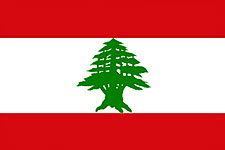Energy Hegemony: Israel Eyes Lebanon’s Offshore Gas Reserves

“We are not obliged to state the limits of our State.” – David Ben Gurion, 14 May 1948
In all regional disputes, big or small, Israel will invariably threaten or implement violence. It is the preferred method of conflict resolution. The recent discovery of natural gas reserves in Lebanese territorial waters, and Israel’s claim to them, is no exception.
It didn’t take long for Israeli infrastructure minister Uzi Landau to raise the prospect of war. That is, if Lebanon attempts to prevent his country from exercising full control over the field despite portions apparently falling within Lebanon’s exclusive economic zone.
“We will not hesitate to use our force and strength to protect not only the rule of law but the international maritime law,” he said. It was an absurd statement, of course, in light of the utter contempt Israel held for maritime law in the attack (in international waters) on the Turkish relief flotilla.
The Tamar natural gas field, 50 miles off Israel’s northern coast, is run by a consortium of American and Israeli companies, including U.S.-based Noble Energy. The latter announced that Tamar may contain up to 8.5 trillion cubic feet of natural gas and a second, Leviathan, 16 trillion. The deposits in these fields, both found in the last 18 months, are more than twice the size of Great Britain’s proven reserves.
Because Tamar appears to extend into Lebanese waters, and in full recognition of Israel’s history of stealing precious water resources from its neighbors, there have been urgent calls for Lebanon to ratify an energy bill. Last week, parliament speaker Nabih Berri indicated he would swiftly work to pass draft legislation to permit offshore oil and natural gas exploration before Israel claims the zone as its own and starts drilling.
“Israel is racing to make the situation a fait accompli and was quick to present itself as an oil emirate—ignoring the fact that, according to the maps, the deposit extends into Lebanese waters. Lebanon must take immediate action to defend its financial, political, economic and sovereign rights,” Berri said.
In an October statement, Norway-based Petroleum Geo-Services confirmed Lebanese waters contain potentially valuable deposits and may prove to be an “exciting new province for oil and gas.”
Despite the pending legislation, the government of Prime Minister Saad Hariri has been criticized for acting too slowly. “The Israeli enemy has started exploring for oil while Lebanon has started exploring an energy law,” quipped one Hezbollah official.
In the latest spat between the two countries still technically at war, one can see how the situation might deteriorate. Indeed, Landau’s threat was one Prime Minister Netanyahu endorsed with his silence.
For Lebanon, the stakes are enormous; potential revenue from tapping into oil and gas reserves would help finance a staggering debt accounting for nearly 150 percent of the country’s gross domestic product.
Will this be the cases belli Israel has been desperately seeking since the July 2006 Lebanon war ended in a humiliating draw?
The debate over which the country’s claim is most sound is not meant to be adjudicated here. What can be said, however, is that Israel’s reflexive threat to use military force to solve this—or any—disagreement with its neighbors cannot be legitimized.
Israel’s history of instigating conflict and then waging war has led to the immeasurable loss of life, land and property. If the pretext to do so again will be control of natural gas reserves shared with Lebanon, the international community must unequivocally declare this an issue to be resolved by rule of law, not act of war.
Rannie Amiri is an independent Middle East commentator.

